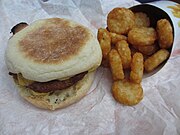Unpacking the Calories: How Burger King’s Fries Stack Up
Craving a crispy side to your meal? Burger King fries are a popular choice for many. But how do they fit into your daily calorie intake? Understanding the nutritional value of these fries can help you make informed dietary choices. With a typical serving size offering a satisfying crunch, it’s essential to know the calorie…
Craving a crispy side to your meal? Burger King fries are a popular choice for many. But how do they fit into your daily calorie intake? Understanding the nutritional value of these fries can help you make informed dietary choices. With a typical serving size offering a satisfying crunch, it’s essential to know the calorie count and other nutritional details. Whether you’re counting calories or just curious, this guide provides a detailed look at Burger King fries’ nutritional profile. Dive in to discover how these fries can fit into a balanced diet while still satisfying your taste buds.
Nutrition Facts
Serving Size 1 large serving (173g)
Amount Per Serving
Calories
430
| Total Fat | 19.00 g | 29% |
| Saturated Fat | 3.5 g | 18% |
| Trans Fat | 0 g | 0% |
| Cholesterol | 0 mg | 0% |
| Sodium | 570 mg | 24% |
| Total Carbohydrate | 57 g | 19% |
| Dietary Fiber | 5 g | 20% |
| Total Sugars | 0 g | 0% |
| Protein | 5 g | 10% |
| Vitamin D | – | 0% |
| Calcium | 20 mg | 2% |
| Iron | 1.8 mg | 10% |
| Potassium | 510 mg | 15% |
* The % Daily Value (DV) tells you how much a nutrient in a serving of food contributes to a daily diet.
2,000 calories a day is used for general nutrition advice.
Nutrient Distribution
Calorie Burn Time
How long would it take to burn off total calories from 100g of Burger King fries?
FAQs
Final Words
Burger King fries can be a delightful treat when enjoyed in moderation. They provide a quick energy boost due to their carbohydrate content and can be part of a balanced diet when paired with healthier options. Remember to consider portion sizes and enjoy them as an occasional indulgence rather than a daily staple.



